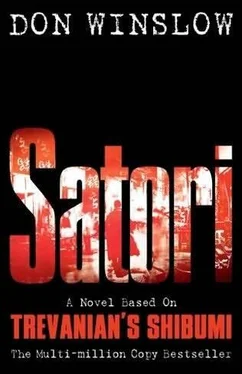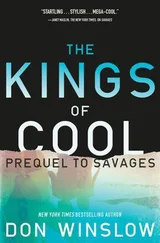He needed to create some space.
His mind flashed to the Go board, where two ways of creating space existed. The traditional and expected move was to place a stone far from the opponent, which in this case would mean accelerating the scooter to try to gain some ground.
The other was to eliminate the opponent’s nearest stone.
Nicholai slowed down to let the car catch up a little and then cranked the handlebars, turned, and charged the car. Firing the pistol with one hand and twisting the throttle with the other, he rode straight at the startled driver like a kamikaze pilot determined to sell his life at high price.
The shooter got off one more burst before he dived out the door. The driver ducked behind the wheel.
At the last second, Nicholai swerved, missed the car by an inch, and drove out into the swirl of traffic on Rue Catinat. Melting into the chaos of rush hour, he made it down to the harbor, across the bridge, and into Cholon.
THE TIGER GROWLED.
It startled Nicholai at first, because he was in a densely populated city, not a remote jungle. Then he recalled that Bay Vien kept a private zoo on his large villa on the fringe of Cholon. Nicholai froze for a moment, then edged along the high stone wall of Bay Vien’s urban fortress.
He had spent the twilight hours hiding in the darkened corners of the Quan Am pagoda on Lao Tu Street in the heart of Cholon. The few pilgrims who came in at dusk to worship the Amithaba Buddha bowed and chanted their Namu Amida Butsu and took no notice of him. When the sun went down and the district was lit only with lamps, Nicholai risked going out. But he stuck to the narrow back streets and avoided the vicinity of Le Grand Monde and Le Parc à Buffles.
He had no way of knowing yet who had tried to kill or kidnap him. It could have been Bao Dai, or Diamond, or Haverford. The attack came ten minutes after Haverford put him in place at the Sporting Bar and then left. Not wasting any time, the ever-efficient Ellis Haverford.
Still, he couldn’t be sure.
Perhaps it was the Sûreté or Deuxième Bureau. It might even have been the Viet Minh, if they had decided that he had betrayed them after all.
Nicholai waited until dark, and then made his way toward Bay Vien’s palatial estate. What if it was Bay Vien who decided to have me killed, Nicholai wondered? Then his guards would doubtless have orders to shoot me on sight.
So best to approach him, shall we say, carefully?
At an outdoor kitchen, he swiped a warm piece of charcoal and put it in his pocket. Now, crouched beside the wall of Bay Vien’s villa, he took out the charcoal, used it to blacken his face and hands, then tossed it into the bushes.
A double strand of barbed wire fringed the eight-foot-high wall, and shards of glass – mostly from Coca-Cola bottles, Nicholai noticed – had been mortared into the top of the stone. A bulky watchtower stood to the side of the iron gate that guarded the main entrance, and searchlights swung back and forth like a prison yard.
There is no choice, Nicholai thought, but to go over the wall.
It was a shame to sacrifice the tailored jacket, but Nicholai shucked it off, waiting for the searchlight to complete its arc, and then tossed it onto the wire. Then he jumped, grabbed on to the jacket, which the barbs now held in place, and swung himself onto the top. He lay there, balanced precariously, until the spotlight finished its next swoop, and then he dropped.
Something moved beneath him.
Nicholai suppressed a shout as the boa constrictor slithered out from under him, its powerful muscles rippling against his ribs. The snake was a good thirteen feet long, shiny in the moonlight. It turned its head, regarded Nicholai for a moment, and then flicked its tongue out to determine if this creature might make a meal.
“No,” Nicholai murmured.
The snake moved off, far more slowly than Nicholai would have preferred. A sensei would have called the snake an omen, a Chinese sifu would have told him to emulate the snake – one of the five model animals of Shaolin kung-fu.
So Nicholai became serpentine as he slithered across the clipped, manicured lawn, the grass, wet with evening dew, soaking his shirt. He kept low to the ground, freezing and pressing his face into the grass when the spotlight swung his way.
Then he saw the tiger.
It was in a cage, perhaps fifty feet off to his left.
It growled a deep, threatening growl, and Nicholai felt a rush of primal fear – an atavistic relic, he thought, from our species’ days in the trees. The tiger’s eyes were beautiful to behold, enchanting in the true sense of the word, and Nicholai felt himself being pulled into the creature’s orbit.
Is that how it happens? he asked himself. Just before your death, are you frozen to the sacrificial altar by sheer awe? Do you realize the magnificence of the world just before you leave it?
He met the tiger’s glare.
Two predators, he thought, who meet in the night.
Then he recalled the old Chinese adage: When tigers fight, one is killed, and the other is mortally wounded.
Good to keep in mind.
Nodding to the caged tiger, Nicholai resumed his slow crawl.
He stopped a hundred feet from the house and observed the guards patrolling the perimeter. There were four of them, walking interlocking routes around the house. Armed with American rifles, they stepped softly and didn’t speak as they passed each other. Just a brief nod to indicate that everything was in order.
The good thing about guards, Nicholai thought, is that they point you toward your target. Each one of them straightened slightly and held his rifle at the ready when he passed outside a certain window on the villa’s second floor. A light shone through the curtain. The window itself was open, although barred with an iron grille.
Bay Vien was home, in his bedroom.
With infinite patience – and gratitude toward his Japanese masters who had taught him that virtue – Nicholai made a slow, crawling circle around the entire villa, searching for a weakness.
He found it in the back, by the kitchen.
A white-jacketed cook sat on a stool outside the open door. Head down, elbows on his thighs, he smoked a cigarette.
Crawling a bit closer, Nicholai could smell the distinct odor of nuoc mom, the Vietnamese fish soup that was a staple of the peasant diet. Nicholai put all his concentration into his sense of hearing and listened. The cook was having a desultory conversation with someone inside. Luckily, he spoke in Chinese, and Nicholai learned that the boy inside was an underling, a servant, his name was Cho, and that the soup was almost ready so Cho shouldn’t disappear to take a nap someplace if he wanted to keep his nuts where they were.
Nicholai waited and timed the guards’ orbits until he learned that there was a thirty-second gap at the kitchen door.
Nicholai closed his eyes and ordered his mind to allow him five minutes of rest. Aware that he was fatigued from the battle on the street and his flight to Cholon, he knew that he had to marshal his energies – the next burst would have to be quick and certain.
When he woke up, the cook had finished his smoke and was back in the kitchen.
Nicholai pulled himself up on his forearms and waited for the next guard to come. The sentry came by the kitchen door and then -
– stopped, as the cook came out and handed him what appeared to be a chunk of fish. The guard slung his rifle over his shoulder, thanked the cook, and stood and ate.
Damn the man, Nicholai thought.
He dropped back down and waited.
The guard ate quickly, but it threw the rotation off, and it took another half hour before the guards’ circuits were back in order. Then Nicholai waited for a sentry to pass by the kitchen, sprang up, and rushed for the door.
Читать дальше












